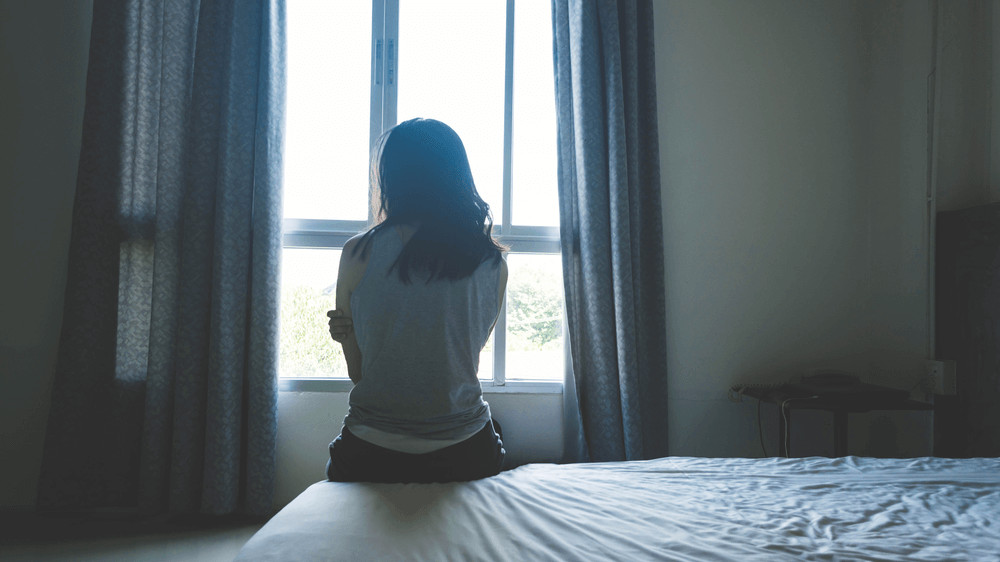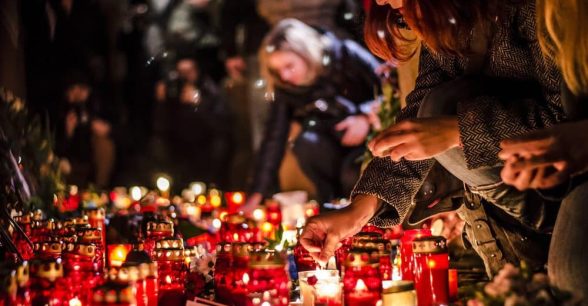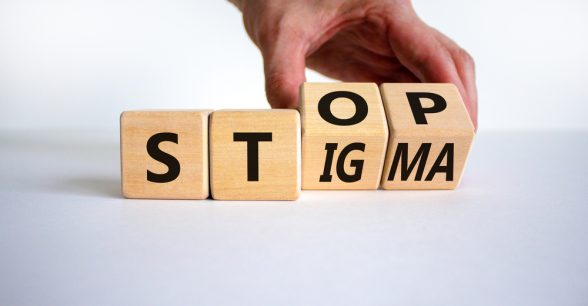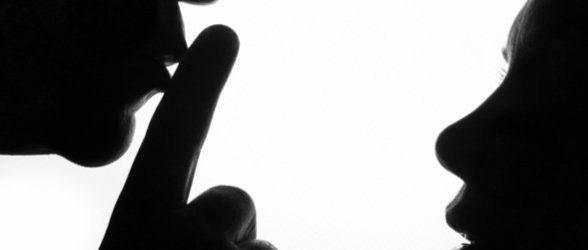Intimacy After Trauma: Navigating Re-Entry Into a Pandemic World
Content note: eating disorders, COVID-19, sexual abuse, sex, trauma
How do you let someone love you when you’re afraid of yourself? I first asked myself this at age 17, anorexic and emotionally isolated by the fear of what my body and mind had become. Lately, this question has been haunting me again as I plan to re-enter the world, vaccinated and unsure of what the pandemic has done to me, to all of us. While I’ve kept an anorexia relapse at bay during the pandemic, I’ve undergone mental and physical transformation. From new physical pains and emotional triggers to a grand mistrust of strangers and existing in public space, I am unsure what intimacy I can foster or embrace, and I cannot be the only one feeling this way. Many disabled people and newly disabled people (i.e. long COVID) have likewise come to see themselves differently through this pandemic. The virus, lockdown orders, and a new wave of antivaxxers have changed the norms of physical relations and trust; even my vaccinated body is a potential threat to others.
As we are pushed back into social spaces, uncoiling from our quarantines, we need to recognize that bodily autonomy includes the capacity to let others love and care for you. The story of how anorexia affected my romantic and sex life, along with the realizations I have made about autonomy and trust in my ongoing recovery, can serve as an entry point into a larger conversation we need to have about trauma, disability, and intimacy as we prepare for a post-pandemic world where we can finally touch one another again without so much risk. My larger aim is to provide solace, perhaps even offer intimacy, to people struggling to form relationships due to trauma and loss of bodily autonomy.
Beginning in what society may call the “dating years,” most of my late teens and early 20s were spent in an on-and-off relationship with anorexia. During relapses, I wouldn’t let anyone near me because if they touched me, they’d feel my bones prodding through my skin like leafless tree branches piercing the winter air. During recoveries, I avoided forming any new relationships because they seemed like potential barriers to healing. Across this uneven process, I became a foreign object to myself. From intrusive thoughts, to night sweats in the middle of the day, to hours-long stomach cramps, I had no idea what my body would be each day.
To face these fears, costly individual therapy and support groups directed me toward the same advice found in greeting cards: you need to love yourself first so you can love others. Certainly, protecting your needs and self-esteem is crucial in any relationship, but this idea says more than that. The great ableist undertone of this idea is that you are incapable of loving and being loved until you love yourself. Such an idea excludes those of us with low self-esteem, mental illness, and survivor’s guilt, making us feel even more isolated and confused about who we are and what we deserve. What is so wrong about needing someone else as long as that love is genuine and reciprocal?
I had been fighting to love myself for over 15 years at that point, and so it was clear that I needed some help and intimacy to break away from my shell of hypervigilance. I returned to the social and dating scenes with the simple and honest aim of “seeing what’s out there” in terms of friends and partners. I did not expect any person to “fix me” (as if I was even broken) or to use someone as a source of validation.
Trying to date ignited every spark of ableism I had internalized; who would want my messy, inconsistent self? Nondisabled people have the privilege of not expecting the unexpected. They wake up and they just assume their body and mind will work as it usually does without interruption. Like many disabled people, I wake up and lack any such assurance. Such instability begins to gnaw at you, fearful of making any promises or plans. This compounded the always-possible threat of sexual assault. More than concerns about potential abusers, I was afraid of myself. The fragile bones and thin muscles of my healing body made me ask: Could I run fast enough? Hit hard enough? Would my body hold out?
Thankfully, I never got answers to these questions. The first time I had sex after recovery, I cried halfway through and then vomited in the bathroom from nerves. With constant headaches, mood swings, and stomach pains, having sex made me feel alienated from my body as well as my partner. My partner was kind and respectful of my boundaries, although I didn’t know my own boundaries. Even compliments about my body triggered me.
These memories are crisper than ever in my mind and bones, as if I am going through this recovery process again. Now, with a lethal virus running wild, I am afraid as one of the millions of disabled people at risk: Could our immune systems protect us? Can our lungs breathe hard enough? What would become of us?
The anxiety embedded in these questions has made me realize the need to find new boundaries, to relearn my body and myself. Of the many things the pandemic has taken from us, it has taken our trust and sense of safety. New and heightened material and emotional risks, from the virus to food security to antivaxxer co-workers, have shattered our boundaries and left us more psychologically exposed and vulnerable as ever. When I felt this way last, during anorexia recovery, it took me many conversations with partners and friends to come to the conclusion that setting boundaries is a process of trial and error, like adding yeast to bread mix; you just have to wait to see how much is enough to let you rise and not crumble. And sometimes yes, you will crumble.
No therapist ever told me that establishing a new relationship with food, exercise, and self-image often requires you to renegotiate how you build emotional and physical intimacy. The roles of food and beauty standards in popular representation of eating disorders overshadow the fact that eating disorders, and many other self-harm tendencies, often result as a coping mechanism for unprocessed trauma.
Likewise, it may not be just the coronavirus or vaccine side effects that have affected us, but also the relationships that were broken—the friends, family, partners, and colleagues who chose to neglect pandemic safety protocols for their own convenience. These losses are traumatic as well, especially since this neglect directly contributed to the spread of the virus and subsequent deaths.
After traumatic events, hypervigilance and self-isolation are normal responses, a way to prevent us from being hurt again. Not unlike people meticulously double-masking and disinfecting every surface, I became fixated on controlling every aspect of my environment and relationships during my recovery attempts. Indeed, these are valid responses to valid threats, especially for disabled people whose health hinges upon these threats materializing. But living this way all the time is not only exhausting, it’s lonely. My fault was thinking that total control was synonymous with self-love and autonomy instead of those being inherently collective and open processes.
The “love yourself first” advice is particularly toxic for people–like myself at this time–who excuse their hypervigilance by saying they are “working on themselves.” This mentality, coupled with individualism, tells us that autonomy is having total control over your life, but what gets lost in that notion is that having control includes giving up control at times. Letting go of control during a spiraling pandemic is certainly high-risk. “Letting go” doesn’t mean going maskless or attending crowded events. It’s about exploring what is uncomfortable for you, sitting with this discomfort, and giving yourself a chance to grow.
An opportunity for this arose when the girl I was seeing at time wanted to plan a day for us in Milwaukee, filled with surprises. However, when the day came, my date was completely unprepared. Watching her fumble with directions, let her phone battery die, and lose track of time, I felt an overwhelming calmness. Part of my mind told me “you should be anxious” but my body said otherwise. After some phone calls and internet searches, we managed to figure out the day. Later that night, I realized my unexpected calmness was the result of growing more intimate with myself and her. I trusted her, she let me down, but trusting her created the space to reawaken a part of myself that has been locked away for years. It was the most free I had felt in years. To gain confidence during a pandemic is to leave and create spaces for the intimacy you need to survive it.
The romance, closeness, and sex are supposed to be the “fun” parts of intimacy, the lesser discussed parts involve what we all really need: care without the requirement or expectation of a return; care that is not part of an exchange system. Nothing has been harder for me to request and accept from others. I have realized, however, the best way to practice “self-love” is to not to care for yourself, but to let others in. Pandemic-related trauma may have shifted our boundaries, or made us realize we don’t have any. As we set these boundaries, leaving an element of unknowing, or simply risk, is the only way to achieve the autonomy that can actually sustain and nourish you.
About Rooted In Rights
Rooted in Rights exists to amplify the perspectives of the disability community. Blog posts and storyteller videos that we publish and content we re-share on social media do not necessarily reflect the opinions or values of Rooted in Rights nor indicate an endorsement of a program or service by Rooted in Rights. We respect and aim to reflect the diversity of opinions and experiences of the disability community. Rooted in Rights seeks to highlight discussions, not direct them. Learn more about Rooted In Rights



